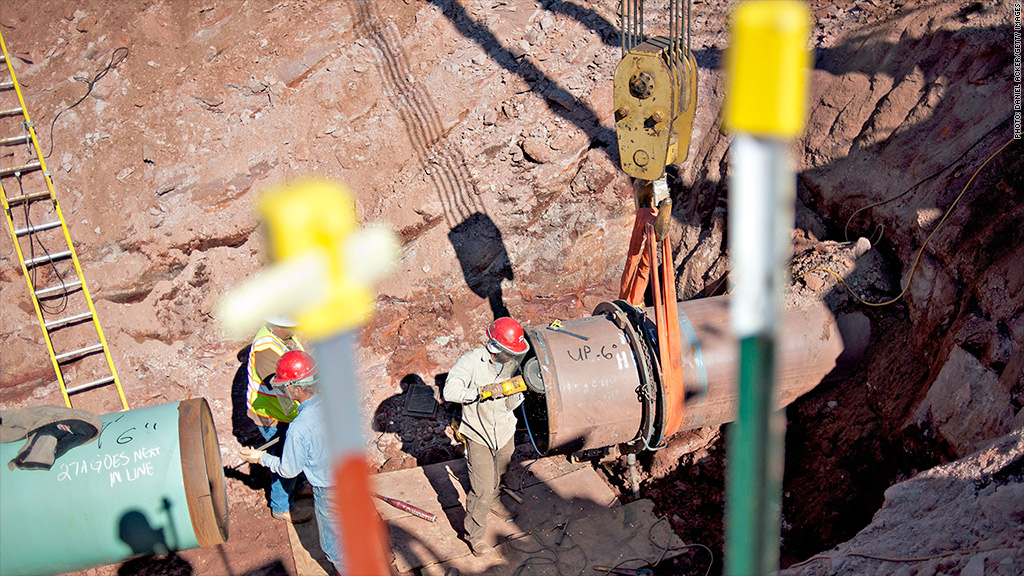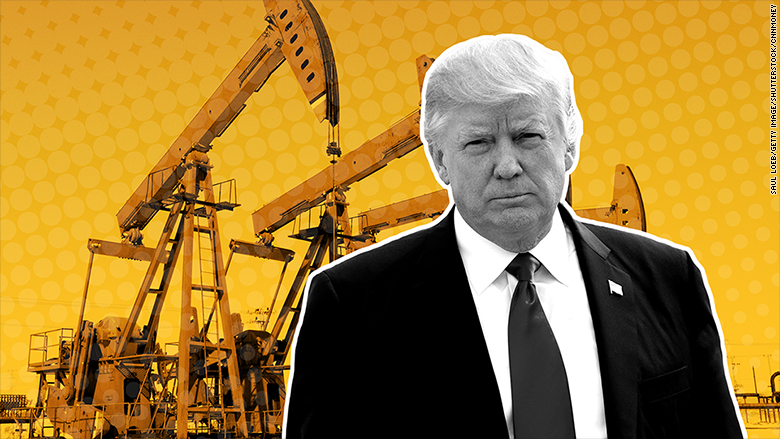
One of the pillars of President Trump's economic agenda is a promise to unleash the American energy industry.
Trump has rolled out a series of executive orders aimed at rejuvenating the battered coal industry and accelerating the rebound of the oil business.
The president plans to sign an executive order on Friday implementing an "America First offshore energy strategy," a person familiar with the matter told CNNMoney. The order will require a review of locations available for offshore oil and gas exploration.
Commerce Secretary Wilbur Ross told reporters this week that "unleashing energy" is a major reason he's confident the US can achieve a goal of at least 3% economic growth.
But don't bank on Trump's energy agenda moving the economic needle any time soon.
Despite the hype, energy experts say Trump's efforts to drill more oil on federal land and cut back on regulations aren't game-changers right now. These moves would take many years before having a real impact.
Trump's energy agenda also often fails to attack the underlying causes behind the struggles of oil and coal.
Related: Why Trump's coal promises are doomed
Take regulation, for example. Trump has railed against a "totally self-inflicted" problem of leaving America's energy potential "untapped."
Trump signed an executive order in late March ordering a review of methane emission limits on oil and gas drilling that were set under President Obama. But environmental rules didn't trigger the downturn in the oil industry. Market forces did.
The historic shale oil boom created an epic glut of crude, causing prices to crash so low that dozens of companies filed for bankruptcy and some 200,000 workers were laid off.
"Prices were suppressed because of oversupply. These changes in regulation aren't going to do anything to alleviate that. If anything, they're going to do the opposite," said Matt Smith, director of commodity research at ClipperData.
Mike Wittner, global head of oil research at Societe Generale, said the dramatic swings in oil prices easily "dwarf" the few dollars per barrel of costs related to environmental regulations.
"Regulation is a hassle. It's a secondary factor, at best," he said.

Trump has also tried to help the coal industry by signing several executive orders aimed at slashing regulation.
But the main culprit for coal's problems has been the abundance of cheap natural gas -- not regulation, according to an analysis released this week by Columbia University.
"Trump's efforts to roll back environmental regulations will not materially improve economic conditions in America's coal communities," the study concluded.
Related: Trump denies Exxon permission to drill in Russia
Likewise, don't expect Trump's executive order about offshore drilling to spark an oil renaissance.
That's because, by definition, offshore drilling is very difficult and expensive. It takes a long time for tangible benefits to materialize.
It also takes a great deal of time before the federal government can open offshore areas to more oil and gas leasing. Lease sales are dictated by a five-year schedule.
"It's just very difficult to steer the federal ship. It's something you implement over a several-year period rather than a 100-day period," said Rob Barnett, senior energy policy analyst at Bloomberg Intelligence.
Efforts to expand drilling can run into fierce legal and political opposition from environmentalists as well as states worried about consequences for tourism.
That's why the energy industry is squarely focused on pumping oil from private land in shale hotbeds like the Permian Basin in Texas.
"The irony is that overwhelmingly the production has come from areas on private land -- where the best geology and best rock is," said Jonathan Garrett, research director at Wood Mackenzie.
"We're not expecting more exploration on federal land to move the needle," he said.
Related: Why Big Oil wants Trump to stay in Paris deal
The most immediate of Trump's energy actions has been on the pipeline front. Despite anger from environmentalists, Trump signed executive orders in January advancing the approval of the Dakota Access and Keystone XL pipelines.
The opening of the Dakota Access Pipeline, which is fiercely opposed by the Standing Rock Sioux Tribe, will unleash crude that had been trapped in North Dakota's Bakken shale play.
But energy analysts wonder if that oil is even necessary right now.
"The industry wasn't struggling because it needed these pipelines to be built," said ClipperData's Smith.


